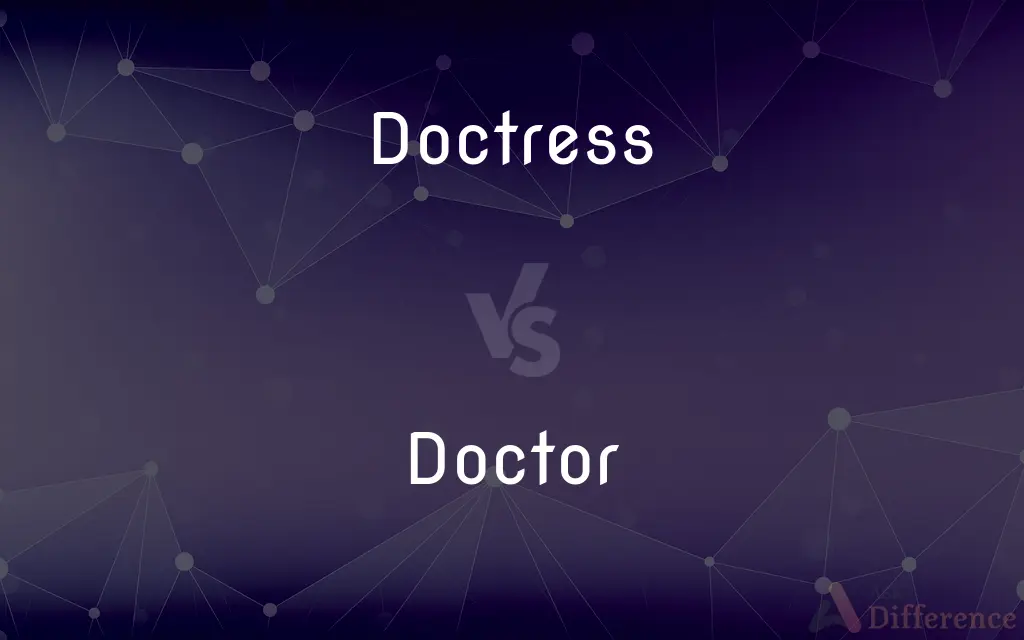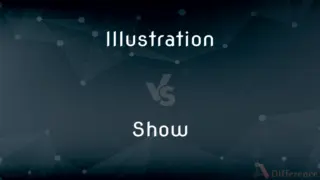Doctress vs. Doctor — What's the Difference?
By Urooj Arif & Fiza Rafique — Updated on April 8, 2024
Doctress historically refers to a female doctor, emphasizing gender, while doctor is a gender-neutral term for a medical professional or someone with a doctorate.

Difference Between Doctress and Doctor
Table of Contents
ADVERTISEMENT
Key Differences
Doctress, an outdated term, once distinguished female practitioners in fields dominated by men, specifically in medicine. Doctor, however, applies to any qualified individual in the medical field or those holding a doctorate degree, regardless of gender. This reflects the evolution of language and societal attitudes towards professional titles and gender equality.
While "doctress" highlighted the gender of the practitioner, today's use of "doctor" focuses on qualification and role rather than gender. This shift underscores the increasing recognition of women's competencies and contributions to their fields on equal terms with men.
In historical contexts, "doctress" might have been used to either diminish or emphasize the novelty of a woman in a traditionally male role. Conversely, the modern term "doctor" signifies professional achievements and expertise, moving beyond gender-based distinctions.
The use of "doctress" has significantly declined as the distinction between male and female professionals in medicine and academia has become less relevant. Today, "doctor" is a title of respect and recognition of expertise, encompassing all genders without discrimination.
Comparison Chart
Definition
An outdated term for a female doctor.
A qualified medical professional or a person with a doctorate degree.
ADVERTISEMENT
Gender Focus
Emphasizes the practitioner's gender.
Gender-neutral, focusing on qualification.
Usage
Historical, now rarely used.
Widely used across all fields of medicine and academia.
Societal Implications
May imply novelty or rarity in professional settings.
Indicates professional achievement and expertise.
Relevance
Declining as gender distinctions in professional titles become less common.
Remains relevant and universally recognized.
Compare with Definitions
Doctress
A female doctor, historically used.
The doctress attended her patients with great care.
Doctor
A qualified medical professional.
The doctor diagnosed the condition accurately.
Doctress
An archaic term for a female medical practitioner.
The doctress was a pioneer for women in healthcare.
Doctor
Someone with a doctorate degree.
She became a doctor of philosophy.
Doctress
Refers to a woman in medicine when gender distinctions were common.
She was known as a skilled doctress in her town.
Doctor
Gender-neutral term for medical practitioners.
The doctor will see you now.
Doctress
Reflects historical gender roles in professions.
The doctress contributed significantly to her field.
Doctor
Signifies professional achievement.
Becoming a doctor was her lifelong dream.
Doctress
Used to denote a female doctor in times past.
As a doctress, she faced many challenges in her career.
Doctor
Used universally across various fields.
He is a doctor in the field of physics.
Doctress
(archaic) A female doctor.
Doctor
A person who is licensed to practice medicine and has trained at a school of medicine or a school of osteopathic medicine; a physician.
Doctress
A female doctor.
Doctor
Any of certain other healthcare professionals, such as a dentist, optometrist, chiropractor, podiatrist, or veterinarian.
Doctor
A practitioner of alternative medicine or folk medicine who does not have traditional medical credentials.
Doctor
A person who has earned the highest academic degree, usually a PhD, awarded by a college or university in a specified discipline.
Doctor
A person awarded an honorary degree by a college or university.
Doctor
Abbr. Dr. Used as a title and form of address for a person holding the degree of doctor.
Doctor
Roman Catholic Church An eminent theologian.
Doctor
A rig or device contrived for remedying an emergency situation or for doing a special task.
Doctor
(Informal) To give medical treatment to
"[He] does more than practice medicine. He doctors people. There's a difference" (Charles Kuralt).
Doctor
To repair, especially in a makeshift manner; rig.
Doctor
To falsify or change in such a way as to make favorable to oneself
Doctored the evidence.
Doctor
To add ingredients so as to improve or conceal the taste, appearance, or quality of
Doctor the soup with a dash of sherry.
Doctor
To alter or modify for a specific end
Doctored my standard speech for the small-town audience.
Doctor
(Baseball) To deface or apply a substance to (the ball) in violation of the rules in order to throw a pitch with extraordinary movement
Was ejected because he doctored the ball with a piece of sandpaper.
Doctor
To practice medicine.
Doctor
A physician; a member of the medical profession; one who is trained and licensed to heal the sick or injured. The final examination and qualification may award a doctor degree in which case the post-nominal letters are D.O., DPM, M.D., DMD, DDS, in the US or MBBS in the UK.
If you still feel unwell tomorrow, see your doctor.
Doctor
A person who has attained a doctorate, such as a Ph.D. or Th.D. or one of many other terminal degrees conferred by a college or university.
Doctor
A veterinarian; a medical practitioner who treats non-human animals.
Doctor
A nickname for a person who has special knowledge or talents to manipulate or arrange transactions.
Doctor
(obsolete) A teacher; one skilled in a profession or a branch of knowledge; a learned man.
Doctor
(dated) Any mechanical contrivance intended to remedy a difficulty or serve some purpose in an exigency.
The doctor of a calico-printing machine, which is a knife to remove superfluous colouring matter
The doctor, or auxiliary engine, also called "donkey engine"
Doctor
A fish, the friar skate.
Doctor
A ship's cook.
Doctor
(transitive) To act as a medical doctor to.
Her children doctored her back to health.
Doctor
To act as a medical doctor.
Doctor
(transitive) To make (someone) into an (academic) doctor; to confer a doctorate upon.
Doctor
(transitive) To physically alter (medically or surgically) a living being in order to change growth or behavior.
They doctored their apple trees by vigorous pruning, and now the dwarfed trees are easier to pick.
We may legally doctor a pet to reduce its libido.
Doctor
(transitive) To genetically alter an extant species.
Mendel's discoveries showed how the evolution of a species may be doctored.
Doctor
(transitive) To alter or make obscure, as with the intention to deceive, especially a document.
To doctor the signature of an instrument with intent to defraud is an example of forgery.
Doctor
(transitive) To adulterate, drug, or poison (drink).
Doctor
To take medicine.
Doctor
A teacher; one skilled in a profession, or branch of knowledge; a learned man.
One of the doctors of Italy, Nicholas Macciavel.
Doctor
An academical title, originally meaning a man so well versed in his department as to be qualified to teach it. Hence: One who has taken the highest degree conferred by a university or college, or has received a diploma of the highest degree; as, a doctor of divinity, of law, of medicine, of music, or of philosophy. Such diplomas may confer an honorary title only.
Doctor
Any mechanical contrivance intended to remedy a difficulty or serve some purpose in an exigency; as, the doctor of a calico-printing machine, which is a knife to remove superfluous coloring matter; the doctor, or auxiliary engine, called also donkey engine.
Doctor
The friar skate.
Doctor
To treat as a physician does; to apply remedies to; to repair; as, to doctor a sick man or a broken cart.
Doctor
To confer a doctorate upon; to make a doctor.
Doctor
To tamper with and arrange for one's own purposes; to falsify; to adulterate; as, to doctor election returns; to doctor whisky.
Doctor
To practice physic.
Doctor
A licensed medical practitioner;
I felt so bad I went to see my doctor
Doctor
(Roman Catholic Church) a title conferred on 33 saints who distinguished themselves through the othodoxy of their theological teaching;
The Doctors of the Church greatly influenced Christian thought down to the late Middle Ages
Doctor
Children take the roles of doctor or patient or nurse and pretend they are at the doctor's office;
The children explored each other's bodies by playing the game of doctor
Doctor
A person who holds Ph.D. degree from an academic institution;
She is a doctor of philosophy in physics
Doctor
Alter and make impure, as with the intention to deceive;
Sophisticate rose water with geraniol
Doctor
Give medical treatment to
Doctor
Restore by replacing a part or putting together what is torn or broken;
She repaired her TV set
Repair my shoes please
Common Curiosities
What is the main difference between doctress and doctor?
Doctress is an outdated, gender-specific term for a female doctor, while doctor is a gender-neutral, universally used title for a medical professional or someone with a doctorate degree.
Can men be referred to as doctresses?
No, the term doctress was specifically used to refer to female doctors.
Is the title doctor used differently in medicine and academia?
No, the title is used similarly in both contexts to denote a high level of expertise and qualification, regardless of the field.
How does the medical community view the term doctress today?
It is largely viewed as archaic and unnecessary, with a preference for the gender-neutral "doctor" to denote medical professionals.
How has the use of gender-specific titles like doctress changed over time?
The decline in the use of gender-specific titles reflects broader societal shifts towards gender equality and the recognition of professional qualifications regardless of gender.
Can a person with a PhD in a non-medical field be called a doctor?
Yes, the term doctor also applies to individuals who have earned a doctorate degree in non-medical fields.
How do patients typically react to the title doctor regardless of the practitioner's gender?
Most patients focus on the practitioner's qualifications and expertise, rather than their gender, when addressed as "doctor."
Are there other gender-specific professional titles like doctress?
Historically, yes, but many such titles are being replaced or phased out in favor of gender-neutral alternatives.
Why is the term doctress no longer widely used?
It has fallen out of favor as society moves towards gender-neutral professional titles and recognizes the equality of all genders in medicine and academia.
What implications does the shift from doctress to doctor have on professional equality?
It signifies progress towards gender equality in the workplace, emphasizing qualifications over gender.
Share Your Discovery

Previous Comparison
Illustration vs. Show
Next Comparison
Squirrel vs. MongooseAuthor Spotlight
Written by
Urooj ArifUrooj is a skilled content writer at Ask Difference, known for her exceptional ability to simplify complex topics into engaging and informative content. With a passion for research and a flair for clear, concise writing, she consistently delivers articles that resonate with our diverse audience.
Co-written by
Fiza RafiqueFiza Rafique is a skilled content writer at AskDifference.com, where she meticulously refines and enhances written pieces. Drawing from her vast editorial expertise, Fiza ensures clarity, accuracy, and precision in every article. Passionate about language, she continually seeks to elevate the quality of content for readers worldwide.
















































